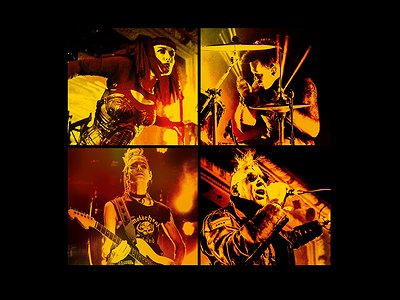Name: KMFDM
Members: Sascha Konietzko, Lucia Cifarelli, Andee Blacksugar, Andy Selway
Interviewee: Sascha Konietzko
Occupation: Vocalist, songwriter, producer (Sascha Konietzko), songwriter, vocalist (Lucia Cifarelli), guitarist (Andee Blacksugar), drummer (Andy Selway)
Nationality: German (Konietzko), American (Cifarelli, Blacksugar), British ( Selway)
Recent release: KMFDM's HYËNA is out via Metropolis.
If you enjoyed this interview with KMFDM and would like to find out more about the band, visit them on Facebook.
Where does the impulse to create something come from for you? What role do often-quoted sources of inspiration like dreams, other forms of art, personal relationships, politics etc play?
All of the above provide in some form or another a spark, an idea to further expand upon. Sometimes it’s a noise, something I happen to stumble upon on line or in movie.
When I am not touring I just create audio by playing around in the studio, trying stuff out. Not necessarily on conventional instruments. I have a collection of sparks that I carry around and revisit from time to time.
Also there’s a plethora of sounds in my sample banks from the past 22 albums that sometimes re-inspire me after years of not having heard them.
For you to get started, do there need to be concrete ideas – or what some have called a 'visualisation' of the finished work? What does the balance between planning and chance look like for you?
I have no idea where the “journey” will take me and that’s liberating, allowing me to experiment. Absolutely no preconceived notions.
Is there a preparation phase for your process? Do you require your tools to be laid out in a particular way, for example, do you need to do 'research' or create 'early versions'?
No. If after, a while, I feel somethings not going anywhere it goes into the “sparks” collection for further evaluation sometime later. A while can be 20 minutes or so, sometimes a few days …
Do you have certain rituals to get you into the right mindset for creating? What role do certain foods or stimulants like coffee, lighting, scents, exercise or reading poetry play?
None ;-)
What do you start with? How difficult is that first line of text, the first note?
It depends, but most often I start with small bits of audio, rarely with lyrics.
There’s a lot (and I mean a LOT) of layering and tracking going on. I like things to be dense and intense.
When do the lyrics enter the picture? Where do they come from? Do lyrics need to grow together with the music or can they emerge from a place of their own?
They usually come at a later point in time, once I see how all turns out.
That said, there’s a lot of lyric-writing going on when I am not listening to music at all.
What makes lyrics good in your opinion? What are your own ambitions and challenges in this regard?
KMFDM is not necessarily a “lyrical” thing, the words have to hit, to punish and hurt a bit.
Once you've started, how does the work gradually emerge?
By just sticking to it, to tickle out what I like about it and discard what not.
Many writers have claimed that as soon as they enter into the process, certain aspects of the narrative are out of their hands. Do you like to keep strict control over the process or is there a sense of following things where they lead you?
Both, in the sense that it’s easy to lose the “red thread” if I don’t stay on top.
On the other hand it’s sometimes necessary to let ideas ferment for a while and be surprised when opening them up again.
Often, while writing, new ideas and alternative roads will open themselves up, pulling and pushing the creator in a different direction. Does this happen to you, too, and how do you deal with it? What do you do with these ideas?
I stick with my gut feeling, with whatever strikes me as best.
There are many descriptions of the creative state. How would you describe it for you personally? Is there an element of spirituality to what you do?
No, generally it is hard and diligent work. When this elated feeling sets in, I know that I am on the right track.
Especially in the digital age, the writing and production process tends towards the infinite. What marks the end of the process? How do you finish a work?
I know when it’s done. If it’s not done when my deadline arrives, it goes into the “sparks” department.
Once a piece is finished, how important is it for you to let it lie and evaluate it later on? How much improvement and refinement do you personally allow until you're satisfied with a piece? What does this process look like in practise?
That is very important. It’s good to take my mind off things and let myself be surprised a month or 2 later, whether in a good or bad way.
What's your take on the role and importance of production, including mixing and mastering for you personally? How involved do you get in this?
Extremely - producing, mixing and putting bells and whistles on my production is a daily chore that I enjoy immensely.
After finishing a piece or album and releasing something into the world, there can be a sense of emptiness. Can you relate to this – and how do you return to the state of creativity after experiencing it?
Not really relating to that. Typically I am done with things and ready to move on. Recording, touring, recording, touring etc.
Creativity can reach many different corners of our lives. Do you personally feel as though writing a piece of music is inherently different from something like making a great cup of coffee? What do you express through music that you couldn't or wouldn't in more 'mundane' tasks?
Making KMFDM is like cooking. And I cook a lot.




